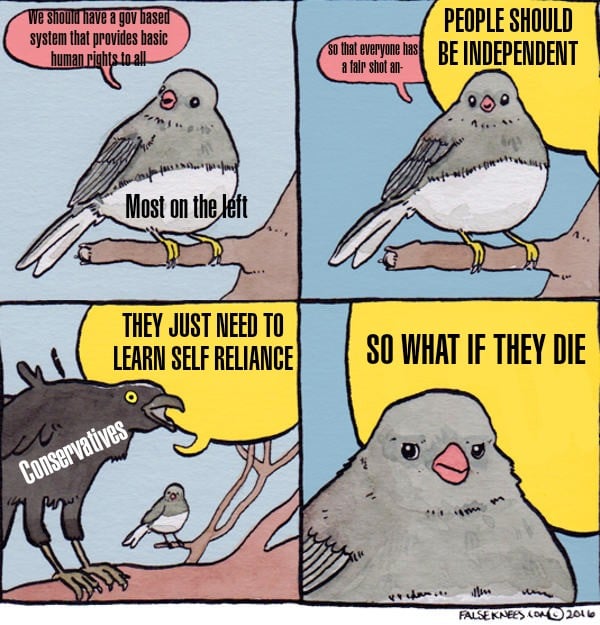this post was submitted on 24 Feb 2025
175 points (97.8% liked)
Political Memes
6250 readers
2619 users here now
Welcome to politcal memes!
These are our rules:
Be civil
Jokes are okay, but don’t intentionally harass or disturb any member of our community. Sexism, racism and bigotry are not allowed. Good faith argumentation only. No posts discouraging people to vote or shaming people for voting.
No misinformation
Don’t post any intentional misinformation. When asked by mods, provide sources for any claims you make.
Posts should be memes
Random pictures do not qualify as memes. Relevance to politics is required.
No bots, spam or self-promotion
Follow instance rules, ask for your bot to be allowed on this community.
founded 2 years ago
MODERATORS
you are viewing a single comment's thread
view the rest of the comments
view the rest of the comments

The right is too stupid to realize helping others is self-serving in the long run.
the right is too unempathetic to realize helping others is immediately self-rewarding
Not everyone experiences an immediate benefit (e.g. feelings of joy) from empathy. I’ve particularly noticed this trait in right-leaning voters. Here is an example.. and I would bet a very large sum of money this person is a trump voter.
A society in which individuals actively help one another is inherently self-serving since mutual cooperation leads to a higher quality of life for all, including the individual providing assistance. When people contribute to the well-being of others, whether through acts of kindness, social programs, or community efforts, they create an environment where support is readily available when they themselves need it. This reciprocal benefit means helping others is not purely altruistic at a macro level.
Cooperation fosters a culture of goodwill and shared responsibility, which ultimately benefits each person within the system. When people see generosity and support as the norm, they are more likely to receive help when they require it, creating a feedback loop of mutual benefit. Ironically, this is the foundation of Christianity.
Further, businesses thrive when workers and consumers are well-supported, crime rates drop in communities with strong social networks, and innovation flourishes when people collaborate rather than compete destructively. Even seemingly selfless acts, like donating to charity or mentoring others, can be viewed as investments in a society that, in turn, provides security, opportunity, and prosperity for all. What may appear— superficially— as altruism is, in reality, a form of enlightened self-interest that ensures the stability and success of individuals by strengthening the collective. The standard transitive property applies: by improving the lives of others, individuals indirectly improve their own circumstances.